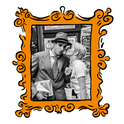Arriving at the Jewish Museum in North London, I had my bag searched before I was let through the reinforced metal door. The tight security was a grim reminder of the threat Jews still face, even in London, even in 2015. In Copenhagen on Sunday, a gunman killed a Jewish man on security duty outside the city’s Great Synagogue, and the number of anti-Semitic incidents is rising in Europe. At the same time, in the week after the Charlie Hedbo killings on 7th January, 26 French mosques were targeted—some with grenades and firebombs.
Amid this fearful atmosphere—and the polarised opinions it invariably fosters—it was a relief to step inside a quirky and quietly profound new exhibition, “Your Jewish Museum: Love”. The idea behind it is simple: ordinary people from different religious and cultural backgrounds submit for display objects that embody, in the curators’ words, “love in various forms, from divine to fraternal, parental and romantic.” These objects are placed alongside pieces from the Museum’s own rich collection charting British-Jewish history. Broadly conceived as moving from birth to childhood, through marriage and death, there are more than 30 pieces ranging from a print of Queen Alexandria in 1911 made up of Biblical verses in Hebrew, to a triptych painting by the London-based artist Regan O’Callaghan of three Christian women from Bethnal Green, to the sari Hasna Hena wore during her marriage in Bangladesh before she moved to England.
Presenting crowd-sourced objects in a gallery, especially ones trying to prompt inter-faith dialogue, risks an easy sentimentality. But Love does not shy away from the complexity of life. Among those items are Chloë Reddaway's first wedding anniversary gift to her husband—some framed verses from the Song of Solomon: “Set me as a seal upon thy heart, as a soul near thine arms, for love’s strong as death.” It’s a beautiful sentiment, for sure. But Chloë adds she cut the verse “jealousy is as cruel as the grave” because it didn’t seem appropriate. “No doubt we edit and translate our thoughts about love and relationships too,” she writes, with wry wisdom. Those same verses from Song of Solomon reappear later in the exhibition in a photograph with a tragic context. After the death of his sister in a car crash, Ross Hammond had them tattooed on his arm—giving new resonance to the line, “love’s strong as death.”
“We wanted something capacious and something everyone could identify with,” says curator Aaron Rosen, a lecturer in sacred traditions and the arts at King’s College. And there is plenty of endearing romance anyone will recognise. Ronna Sauerhoff gamely shows us a personal advert she put in her Jewish community newspaper: “36…fit and easy on the eyes. Seeks smart, secure, emotionally mature, good looking man of substance…” She found her match and they have been married 20 years. There is a priceless email exchange between two students awkwardly planning a first date. A flag pin with the Indian and Scottish flags entwined shows the serendipity of love. Megha Harish was given the pin by her mother, who got it at an India-Scotland leadership program. “At the time it meant nothing; it was just cute,” she writes. Now it has taken on a deeper meaning. “I am a naive second-year at university who thinks she may have found the love of her life. I’m Indian. He’s Scottish.”
An image that speaks powerfully to our times is a recent example of Jewish-Muslim understanding. Submitted by Shahed Saleem, it is a photograph of a window from Fieldgate Street Synagogue taken from inside the East London Mosque. The synagogue, built in 1899 in what was a bustling Jewish area, is now surrounded on three sides by a mosque mainly serving Muslims of Bangladeshi heritage. When the mosque was being built in the 1980s, care was taken not to enshroud the synagogue in darkness, and so it included specially designed skylights and openings to allow light to shine from the mosque through the synagogue window, illuminating the Star of David. Given the current tensions in the Middle East and indeed in Europe, the image is a poignant reminder of the spirit of cooperation and openness that is possible between peoples—a spirit that pervades this admirable exhibition.
Your Jewish Museum: Love runs until Sunday 19th April at the Jewish Museum in London
[gallery ids="30400,30399,30398,30397,30396"]
Jewish Museum shows the power of love
A quirky and quietly profound exhibition displays crowd-sourced objects that cross religious boundaries
February 19, 2015

Fieldgate Street Synagogue window, from inside East London Mosque











